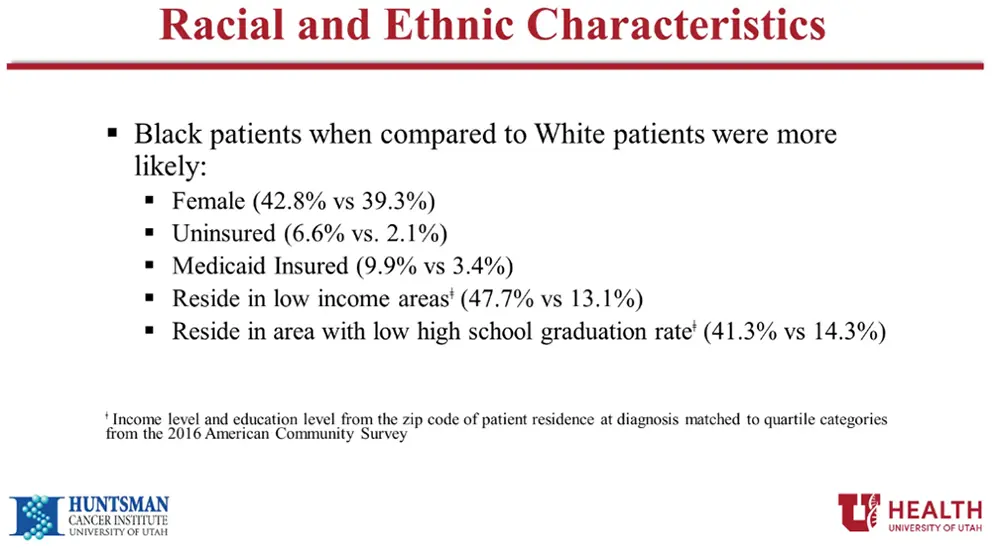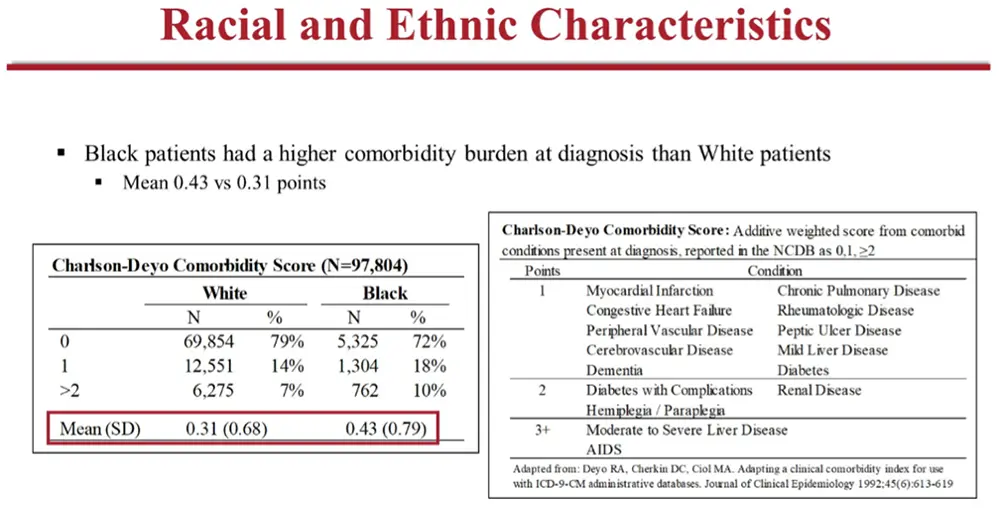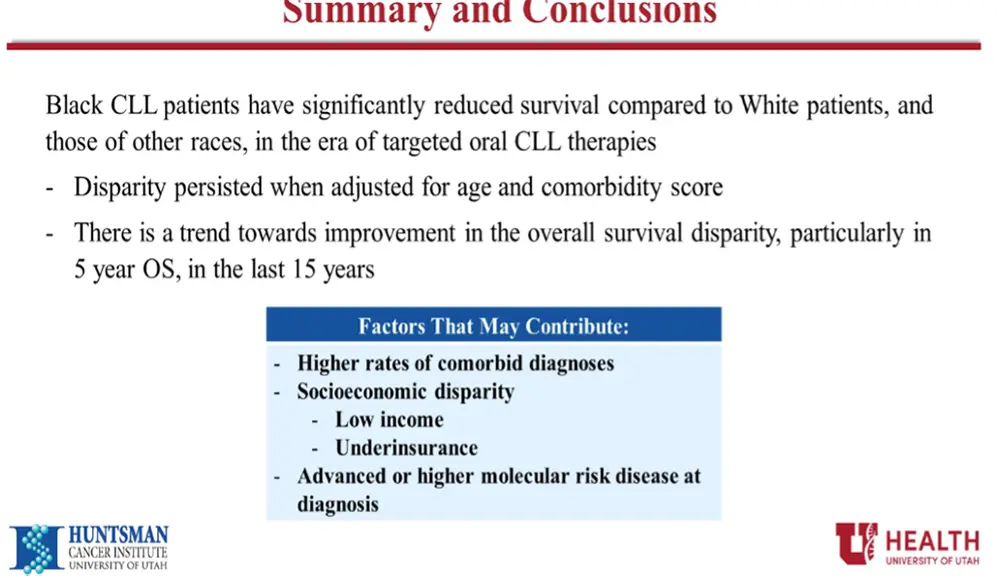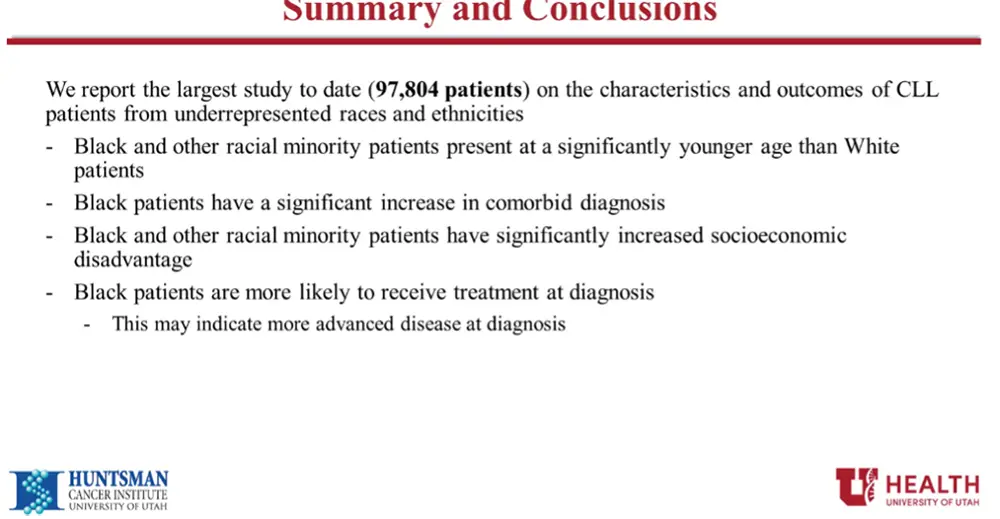What follows is our patient-friendly summary of this research.
The Bottom Line:
Black CLL patients die sooner than their white counterparts, even when controlling for other risk factors. In addition, the gap in overall survival has not improved between 2004 to 2018.
Who Performed the Research and Where Was it Presented:
Dr. Victoria Vardell and her colleagues at the Huntsman Cancer Institute in Salt Lake City, Utah, presented the results at the American Society of Clinical Oncology (ASCO) Annual Meeting in 2022.
Background:
Chronic lymphocytic leukemia (CLL) patients have highly variable outcomes, with many having an average life expectancy and others passing quickly from their disease or its complications. CLL occurs most commonly in older white men. As a result, that group has been well studied in the research, but there are too few studies of CLL among minorities. The researchers wanted to address this knowledge gap by enquiring about the differences in treatments and outcomes based on race.
Method and Participants:
The National Cancer Database was used to identify CLL patients diagnosed from 2004-2018.
- 97,804 CLL patients were identified:
- 90.7% of patients were White
- 7.6% Black (N = 7,391)
- 2.6% Hispanic (N = 2,487)
- 0.6% Asian (N = 613)
- 1.1% were other.
- Compared to Whites, Blacks were younger at diagnosis (median age 66 years] vs. 70 years more likely to have ≥1 comorbidity or other illness (27.9% vs. 21.3%) and to be uninsured (6.6% vs. 2.1%).

Results:
- Black patients were more likely than White patients to have their CLL treated immediately after diagnosis (35.9% vs 23.6%), foregoing the usually recommended practice of “watch and wait” in more than two out of every three patients.
- With a median follow-up of 4.3 years, the median overall survival (OS) for all CLL patients was 9.0 years.
- Black patients had a shorter median OS of 7.0 years compared to White patients with 9.14 years.
- Adjusting for age and using a standardized scale known as the Charlson-Deyo score to balance for other illnesses or comorbidities, the Black race was still independently associated with shorter OS with a Hazard Ration (HR) of 1.51, meaning that more than half were likely to die sooner than a similar White CLL patient.
- While OS improved over time for all races, the relative survival of Black compared to White patients did not. For example, compared to the White population, Black patients diagnosed between 2004-2006 had an HR of 1.64 for mortality, and those diagnosed between 2016-2018 had an identical HR of 1.64, meaning at both the beginning of the study period and at its end, Blacks had a 64% higher chance of dying sooner than a White with CLL.



Conclusions and Comments:
The black race is associated with a shorter lifespan for CLL patients. While all those with CLL live longer now than in the past, blacks have not closed the gap in life expectancy. We need answers to address this persisting disparity.


Links and Resources:
Watch my monologue on the abstract below:
The ASCO 2022 abstract that gives more detailed statistics can be found here: Influence of racial and ethnic identity on overall survival in patients with chronic lymphocytic leukemia.
CLL Society is working with Mayo Clinic on a trial as to why this might be. Is it something about the disease in blacks, or is the answer more environmental, or is it about treatment choices? We simply don’t know, but if you are from an underrepresented minority, please consider helping us get the answers by enrolling in the free trial: The Genetics of Chronic Lymphocytic Leukemia/Small Lymphocytic Lymphoma (CLL / SLL) in African Americans and Other Minorities.
This study from the American Society of Hematology (ASH) Annual Meeting in 2021: Uptake of Novel Agents (NAs) As First-Line Treatments for Black and White Patients with Chronic Lymphocytic Leukemia (CLL) in the Veterans Health Administration (VHA): A Retrospective Cohort Study did show marked improvement and closing of the therapy gap in the VHA over time. Will this eventually lead to a better outcome? Time will tell.
Stay strong. We are all in this together.
Brian
Brian Koffman MDCM (retired) MS Ed (he, him, his)
Co-Founder, Executive VP, and Chief Medical Officer, CLL Society, Inc.
















